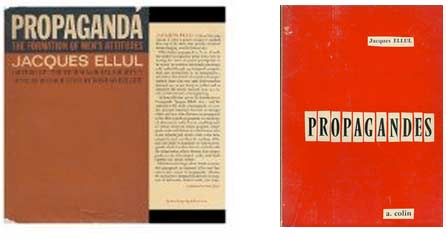Featured Books by Jacques Ellul
Dates on this page indicate first printing in English. For complete publishing information, including original French dates, please see the webpage titled Bibliography of Ellul Books.
Propaganda: The Formation of Men’s Attitudes (1965)
Summary by Randal Marlin
Jacques Ellul’s Propaganda, first published in French as “Propagandes” in 1962 is a widely studied classic with no sign of diminishing relevance for understanding and dealing with the major social, political and ecological problems in the contemporary world. Ellul’s pioneering study directed attention away from the perception of propaganda as simply a mechanism for influencing targeted populations, and towards a more pervasive phenomenon affecting our thinking at the deepest, most foundational levels. For Ellul modern propaganda has gone beyond persuasion as practiced and studied by rhetoricians. The development of sophisticated scientific techniques for manipulating minds along with the use of mass media for applying these techniques on the widest scale has shown its power to effect changes in human personality.
Propaganda according to Ellul is a key component of an ever-expanding technological society that escapes our control. Preservation of our freedom and autonomy will require recognizing its power. Promotion of war is one obvious reason for concern about propaganda, but special vigilance will always be needed to defend humanistic values against the inroads so often seductively presented in the name of efficiency. Ellul’s emphasis on the individual’s need for propaganda, his categorization of kinds of propaganda, his attention to the importance of pre-propaganda and the myths that sustain propaganda, and the paradox of modern democracy that both needs propaganda to function but is also antithetic to it—all of these are among Ellul’s great contributions in this book.
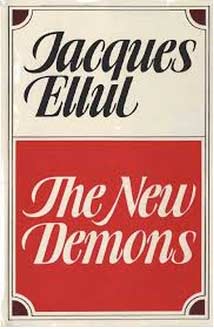 The New Demons (1975)
The New Demons (1975)
Summary by Darrell J. Fasching
When Ellul’s work first began to be published in United States in the 1960s and 70s, his readers fell into two camps—his sociological fans and his theological fans, each often unaware of Ellul’s “other side.” For Ellul, the separation was deliberate. Science should not be confused with theology and vice versa. The business of sociology is to analyze the causal chains that determine our lives. It cannot provide, in itself, the way to freedom. Necessity is the product of the sacralization of society which seduces humans into embracing our utopian hope that technology can fulfill our wildest hopes and dreams for the good things of life. So enthralled, we become blind and unable to challenge its determinisms. We seek the wonders produced by nuclear power and end up threatened with global annihilation. We seek the abundance technology can produce and end up with global pollution and global warming. Such is the paradox created by our utopian hopes.
What The New Demons does is demythologize modern technological civilization by noting its similarities to pre-biblical ancient societies. The response to the powers of technology is analogized to the sacral awe attributed to the powers of nature in polytheism. The function of politics is analogized to the function of ritual in polytheistic societies; conforming people to a sacred social order. And the function of mass media is analogized to the materialist/consumerist elements of polytheistic myths that invoke the gods to bring prosperity and the acquisition of the goods of life. Finally, Ellul adds his “Coda to Christians” where for the first time in his sociological writings he suggests that the answer to these paradoxes must come from outside the sociological frame of reference—in a theology that offers an apocalypse of hope, desacralizing “the sacred heart of a technical universe” and initiating a cultural revolution which liberates us from the sacred and sanctifies or makes holy the world we live in.
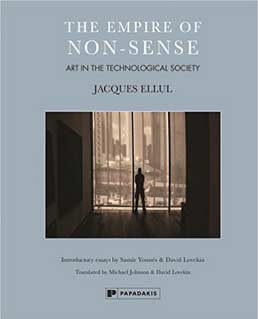 The Empire of Non-Sense: Art in the Technological Society (2014)
The Empire of Non-Sense: Art in the Technological Society (2014)
Summary by David Lovekin
Many modern artists and architects continue to imagine and to express the world technologically. They remain firm believers in technology as a liberator from previous artistic traditions and as source of vast means of production. All artistic traditions were seemingly put aside by the paintings of Cézanne, the poetry of Baudelaire, and the architecture of Le Corbusier. Jacques Ellul, instead, found in technology an absolute slavery. The artist became the handmaiden of technology like other citizens of technological culture; art and artist lose their transcendental status. In this volume Ellul examines this degradation of art from the beginning of the twentieth century; he shows how the sense of art—its meaning and embodiments—is reduced to non-sense. Originally published in France in 1980 we now have an English translation by Michael Johnson and David Lovekin in 2014 with introductory essays by Samir Younès and David Lovekin.
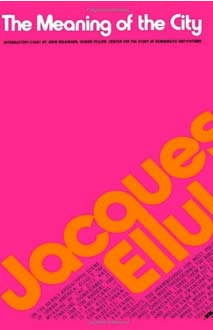 The Meaning of the City (1970)
The Meaning of the City (1970)
Summary by Virginia Landgraf
In this work of biblical exegesis, Ellul depicts the city as epitomizing human rebellion against God, yet God listens to human beings and ultimately gives them a city. Building cities is an attempt to construct an environment of one’s own making to guarantee one’s security instead of depending on God. The city is accursed and a spiritual power above and beyond its inhabitants. It is a center of war, a place where everything is for sale, parasitic on its countryside for population and supplies, and encourages mass culture rather than real roots or security. This spiritual power will ultimately be destroyed (as is Babylon in Revelation 18). However, even in the Old Testament, God hints at another future for the city. God instructs the Israelites to build cities of refuge and the exiles in Babylon to seek the welfare of the city where they live. Nineveh repents, and God does not destroy it. Jesus Christ brings people out of the crowd and frees them to be the people they are before God even in the city. The part of the new heaven and new earth reserved for people is not a garden, but a city, the new Jerusalem.
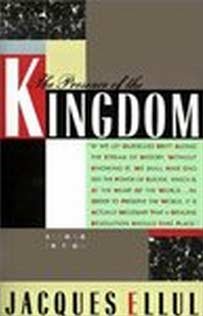 The Presence of the Kingdom (1967, 1989)
The Presence of the Kingdom (1967, 1989)
Summary by Virginia Landgraf
This is Ellul’s 1946 manifesto for Christians that serves as a preview for much of his work. Theologically, he is fighting against two currents: a spiritualization of the Christian message that denies that Christianity has anything to say to people’s concrete lives here and now, or a programmatic activism trying to bring in the kingdom of God by institutional change. Ellul denies that human activity can make the world less sinful—that is only for God to bring about—but also denies that Christians can accept it as it is. He characterizes contemporary civilization as bent on suicide and profoundly wasting people’s time. Christian presence in the world as people redeemed by God and able to resist the idols of the present age should be more revolutionary than regime changes that do not alter the underlying idolatry. Elements of that idolatry—which Ellul will elaborate on later in both his sociological and theological work—include the replacement of ends by means, values by facts, and sober judgment by explanatory myths.
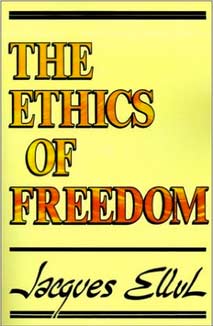 The Ethics of Freedom (1976)
The Ethics of Freedom (1976)
Summary by Virginia Landgraf
This is the English translation of what roughly corresponds to volumes 1 and 3 of Éthique de la liberté, Ellul’s exposition of freedom as the aspect of Christian ethics which corresponds to hope. Ellul hadoriginally planned a four-part series on Christian ethics, with an introduction and three main parts corresponding to the traditional theological virtues of hope, faith, and love. During his lifetime only the introduction (which was published as To Will and to Do) and the ethics of hope/freedom were published; he left The Ethics of Holiness, corresponding to faith, in manuscript form at his death, and The Ethics of Relationship, corresponding to love, was never written. According to Ellul, freedom in Christ should not be confused with freedom to choose between two options posed by the world – which is dominated by powers in revolt against God that promise a horizon only of alienation and sociological determinism—but freedom to go beyond the world’s apparent options. But it is not freedom to escape the world—it is lived within the world, pushing against its limits and sometimes transgressing apparent norms. It is also not to be confused with libertinism, since all things are to be done for the glory of God and love of neighbor.
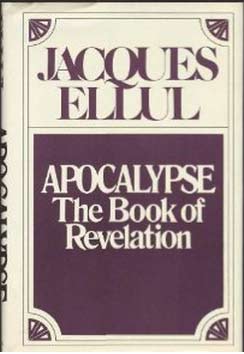 Apocalypse: The Book of Revelation (1977)
Apocalypse: The Book of Revelation (1977)
Summary by Darrell J. Fasching
No book of scripture has been more controversial in its status in the biblical canon than The Book of Revelation. And yet Jacques Ellul not only makes profound sense of it but demonstrates that it teaches the Gospel as a message of universal salvation. He does this in part by embracing Karl Barth’s understanding that the good news of Revelation is that the one who comes to judge us is the one who died for our sins to redeem us. So how could there be any reason to fear the message of Revelation?
Ellul, however, is not content to hide behind this Barthian proclamation as a doctrinaire declaration, but instead demonstrates this good news in a chapter-by-chapter exegesis, dividing the book into five sections, each of which is organized around the number 7— seven letters to the churches, seven seals revealing the course of history, seven angels with trumpets announcing the coming final judgment, seven bowls of judgment, and seven visions of the New Jerusalem.
Two examples show the power of his exegesis. Ellul points out that the seventh angel who announces the coming judgment, with a trumpet, descends from the heavens surrounded by a rainbow, which recalls the covenant God made with Noah after the flood, promising never again to destroy the human race because of its sin. The cross now deals with sin by forgiveness, not punishment. Before major judgment falls on Babylon (the embodiment of all cities enslaved to sin), all the people in the cities are called out of Babylon and “stand at a safe distance.” The city as a possession of demonic powers and those powers themselves will be cast into the lake of fire but the city inhabitants are spared. Immediately then, we are taken to the final seven visions of the New Jerusalem where all the pagan nations and all the kings of the earth enter in to live by its light.
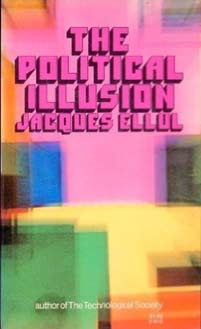 The Political Illusion (1965)
The Political Illusion (1965)
Summary by David Lovekin
The Political Illusion (1965) was essential to Ellul’s trinity of social criticism following The Technological Society (1954) and Propaganda (1962). The illusion was made possible by the cliché that politics was all important when it no longer existed, an understanding revealed in the terms le politique and la politique. The former embodied concerns for the goals and values that portended a common good, like truth, beauty, and goodness, values external to the society; the latter was a concern for procedure, method, and implementation that were internal to the technical system produced by abstract principles and reasoning that produce technical phenomena.
Ellul prophetically understood that politics would be conducted with opinion polls that persuade and preserve the illusions of freedom that, in turn, strengthen the technical system that operates autonomously and automatically, culminating in the sacralization of technique. Hitler won the war, Ellul proclaimed; all modern states now operate with propaganda and with the coordination of techniques. “To exist is to resist,” Ellul stated. Technique has become the new necessity that obviates and co-opts human choice with the attitude that what can be done will be done. It is this powerful force that humanity must resist. Existence depends upon it.

